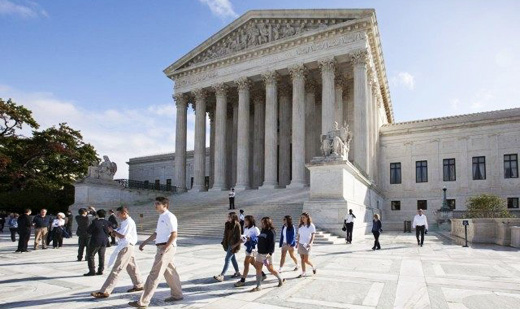
WASHINGTON – Once again, right wingers have come up with a scheme to dilute and diminish the voting power of minorities. The scheme was declared unconstitutional by a lower court, but the right wingers are counting on the Supreme Court to allow implementation of their plan.
They might get what they want.
Sue Evenwel and Edward Pfenninger, two Republican leaders in Texas, want voting districts to be drawn up based only on the number of eligible voters. Currently, like most states, Texas draws up voting districts to capture roughly equal numbers of residents, whether they can vote or not.
Evenwel and Pfenninger contend that their voting power is lessened because “in Texas, large numbers of non-voters swell the population of certain geographic locations.”
These two know full well that the Latino community as a whole has disproportionately high percentages of people who can’t vote because they are too young or because they are considered resident aliens.
They know full well that if their plan is okayed by the Supreme Court, almost every Latino community in Texas would be underrepresented in legislatures.
Moreover, Evenwel and Pfenninger know full well that under their plan cities with growing populations would be prevented from having growing legislative power. Instead, older, richer and whiter rural areas would gain political clout far out of proportion to the number of people who live there.
The reason? Voting districts must have roughly equal populations. If “populations” were to be defined as “those people eligible to vote,” majority Latino districts would have to shrink and would have fewer elected representatives than they now have.
Experts predict that if the Supreme Court decides in favor of the scheme, it could set a precedent that could result in 55 percent of the Latino population nationwide being underrepresented
The Cato Institute, a right wing think tank, didn’t even bother to hide the real intent of the eligible-voters only ploy. In its brief urging the Supreme Court to take the case, the Institute wrote: “Evenwel is about race and national origin. Under the current basis, a relatively small constituency of eligible Hispanic voters … have their votes ‘over-weighted’ and ‘over-valuated,’ effectively diluting the votes of eligible voters in districts with fewer Latinos.”
After reading the Cato Institute’s brief, the Supreme Court agreed to take the case.
Some legal experts were surprised.
In November, a three-judge panel of the federal district court in Austin dismissed the Evenwel case, saying that “the Supreme Court has generally used total population as the metric of comparison.” Furthermore, federal appeals courts have uniformly ruled that counting everyone is permissible, and one court has indicated that it is required.
In fact, over the past 25 years, the Supreme Court turned away at least three cases similar to Evenwel.
However, we now have the Roberts court.
Chief Justice John Roberts years ago cut his teeth on coming up with ways to get around the Voting Rights Act.
In 2013, he led the Court in gutting the Act altogether.
Evenwel and Pfenninger are being represented by the Project on Fair Representation, the small conservative advocacy group that brought the Voting Rights Act case to the Supreme Court. It is also behind a pending challenge to affirmative action in admissions at the University of Texas at Austin.
The Supreme Court is expected to rule on the Evenwel case before the upcoming presidential elections.
Although the case itself deals only with Texas state senatorial voting districts, Richard L. Hasen, a law professor at the University of California, Irvine, was quoted in the New York Times as saying that “the logic of the decision in Evenwel will likely carry over to congressional redistricting.”
As a contender to become the Democratic nominee for President, Senator Bernie Sanders said, “Once again, we have people trying to rig the electoral system to try to dictate an outcome in favor of the right wing.
“Why don’t far right Republicans in Texas have the courage to run on the merits of their ideology instead of trying to take representation away from others?”
Photo: AP












Comments